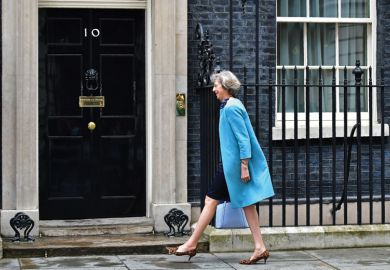In the current, often challenging debate about the purpose and value of higher education, there is a group whose voice has not been heard – and that is the public.
That is why the findings of a large-scale opinion poll carried out for Universities UK earlier this year are so interesting. They reveal that the public has not lost faith in Britain’s universities. In fact, the public views universities as a vital force not just for individual advancement, but for cultural enrichment and national prosperity.
The survey of 2,063 UK adults showed that just 9 per cent of the public feel negative towards universities, with 48 per cent saying they feel positive.
Two-thirds of people agreed with the statement that they would encourage their children to attend university, with only 16 per cent disagreeing. More than half (58 per cent) believe that universities have a positive impact on the UK as a whole, and 70 per cent of people agree that UK universities are among the best in world, with just 11 per cent disagreeing.
There has been significant coverage about access to university and attainment for ethnic minorities over the past 18 months, raising valid questions that universities must deal with. But this poll reveals that black and minority ethnic (BAME) communities have high levels of confidence in the university sector. BAME adults are much more likely to say that universities have a positive impact on their family than white adults.
What, I hear you say, about young people now facing the “mountain of debt” that everyone always talks about? Surely they have lost faith in the idea that going to university is a good thing, and worry that they won’t be able to access any help with their finances. Well, it turns out that as well as the public overall feeling positive rather than negative towards universities, younger people are more positive than older people.
Younger generations are much more likely to say that it is easy to get the financial support and loans necessary to go to university. Fifty-five per cent of 18- to 24-year-olds and 44 per cent of 25- to 34-year-olds also say that universities have had a positive impact on them personally, compared with 35 per cent of people aged 65 and older. Interestingly, young people are also much more likely to disagree with the statement “university degrees do not equip graduates with the skills they need to be successful in the workplace”.
These findings are extremely important. Since 2010, universities have become a combination of piggy bank and punchbag for politicians. Universities have also been conscripted into a culture war around immigration with the imposition of a post-study work visa regime that puts the UK at a serious competitive disadvantage and prevents employers, particularly smaller businesses, from recruiting the skilled international graduates they need.
Coupled with the insistence that foreign students be included in immigration targets, the UK is nursing a self-inflicted wound that is jeopardising a highly successful British export – and a significant revenue source – and damaging Britain’s reputation overseas.
Meanwhile, the sector faces the prospect of huge difficulties around Brexit. Unless the right agreement is struck, there will be higher barriers to recruiting researchers and students from Europe and we could lose access to the popular and life-changing Erasmus scheme. Vital research collaborations are also in jeopardy.
We have changed. Universities are adapting to a funding system that drives greater competition, managing a period of major regulatory change and working with the government on new initiatives such as the teaching excellence framework. And we have more to contribute to the government’s ambitious industrial strategy.
Britain’s universities are a scientific, research and technological powerhouse, without which the goals of the industrial strategy stand little chance of being reached.
Each year hundreds of thousands of sophisticated, intelligent, skilled graduates go out to innovate, to contribute to the workplace and to give back to society. We are a vital partner for the NHS. We bring knowledge, culture and learning to communities from the furthest tips of the UK to the centres of our greatest cities. We are the single biggest British success story – with a global impact that far outdistances our competitors. The public knows this. It is time for politicians to join them and work with us to cement and celebrate success.
Dame Janet Beer is president of Universities UK and vice-chancellor of the University of Liverpool.
POSTSCRIPT:
Print headline: Government must join the public and be in universities’ corner
Register to continue
Why register?
- Registration is free and only takes a moment
- Once registered, you can read 3 articles a month
- Sign up for our newsletter
Subscribe
Or subscribe for unlimited access to:
- Unlimited access to news, views, insights & reviews
- Digital editions
- Digital access to THE’s university and college rankings analysis
Already registered or a current subscriber?




